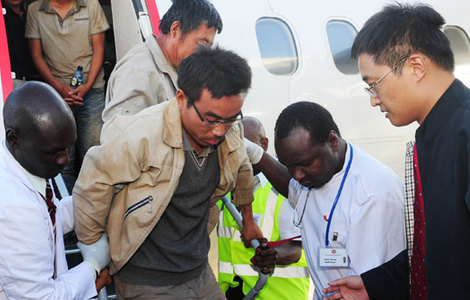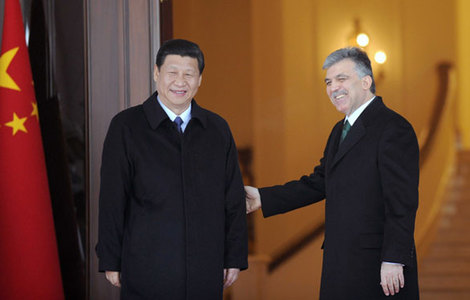More consideration given to guards for overseas workers
Updated: 2012-02-22 07:27
By Xu Wei (China Daily)
|
|||||||||
BEIJING - Calls for security guards from China to accompany workers posted in dangerous areas overseas have increased since kidnappings in Sudan and Egypt underscored the danger workers face as Chinese companies expand globally.
The abductions highlight the urgency to ensure the security of Chinese workers overseas, said Han Fangming, deputy director of the foreign affairs committee of the Chinese People's Political Consultative Conference National Committee, on his micro blog.
Han said that there is a need to study how private security contractors in the United States, such as Academi, work and "when the time is right, the government might allow qualified companies" to establish such services.
Han is also a board director of Sinohydro Corp, 29 of whose workers were kidnapped in Sudan on Jan 28. Three days later, 25 Chinese workers were abducted by tribesmen in Egypt.
Han said he has proposed to the Sinohydro top management team that more risk assessment of destinations must be conducted before sending workers abroad.
Xu Yuan, a road engineer at Sinohydro's Tanzania program, said safety issues have been one of the concerns of Chinese workers at the camp since the two incidents.
"Before, we thought the only danger was of accidents at construction sites," Xu told China Daily by e-mail, "but after the incidents, we could not help asking who can guarantee our safety if something like that happened here?"
Xu said that they have local security guards, but most of them do not seem to be reliable enough to be trusted in a crisis.
Though in Tanzania there is less chance of military attacks by rebels, Xu said, theft is common at the workers' camp, despite the armed local security guards.
"Even if security guards from China couldn't guarantee workers' personal safety, they could probably make sure our property didn't disappear so often," Xu said.
But Chinese security companies have said they are far from being prepared for safety assignments overseas.
Fu Shen, manager of the overseas affairs branch of Beijing General Security Service, said few security companies in China offer security service overseas. Fu's branch works with embassies and airlines in Beijing.
"It's not all about making money. We also need to do a risk assessment of a new location when we decide to extend our service to certain places," Fu said. "And we need to ensure the safety of security guards."
In addition, national regulations on security guards do not cover security services overseas.
Another factor to consider is how prepared the security services are to handle dangerous situations.
"I think security guards in China are far from the level of private security contractors like Academi in the US," Fu said.
Meanwhile, some experts said there are even more basic issues to consider before sending security guards overseas, such as legal issues.
Normally, local police and embassies are responsible for the safety of foreign nationals overseas, said Feng Xia, a professor of international law at China University of Political Science and Law.
But if a country could not fulfill that obligation, Feng said, one solution would be for the two governments to reach an agreement on the dispatching of security forces.
Feng said the act of dispatching security forces abroad would be warranted only in exceptional cases and should be done only by the government.
"Based on international law, it is inappropriate to send security guards overseas because that shows a lack of trust in the other country's own security capacity."
Hot Topics
Wu Ying, iPad, Jeremy Lin, Valentine's Day, Real Name, Whitney Houston, Syria,Iranian issue, Sanyan tourism, Giving birth in Hong Kong, Cadmium spill, housing policy
Editor's Picks

|

|

|

|

|

|







